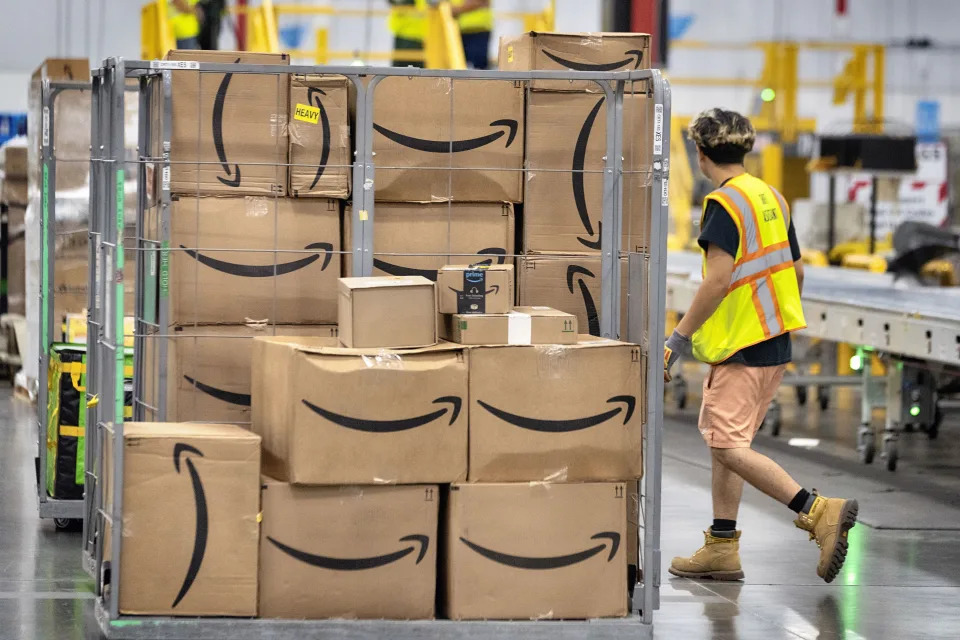Amazon's ( AMZN ) stock fell more than 8% Friday after the retail and cloud giant offered a current quarter forecast on Thursday that fell short of expectations on both the top and bottom lines.
The disappointing returns were amplified by a weak July jobs report, which sent the tech world and the broader market deep into the red.
For the third quarter, Amazon guided sales to a range of $154 billion-$158.5 billion compared to analyst forecasts for $158.43 billion, according to Bloomberg data. Its operating income in the third quarter is set to fall within a range of $11.5 billion-$15 billion. Wall Street had expected operating income to come in closer to $15.2 billion.
The report wrapped a wave of Big Tech results that have flashed warnings that investors have limited patience for massive AI spending. Any weakness in the core business has heightened the scrutiny on Wall Street.
Even as Amazon brought home earnings per share (EPS) of $1.26, beating estimates of $1.04 and nearly doubling profits from the same period last year, investors focused instead on the report's weaknesses.
Amazon generated revenue of $148 billion, a touch below the $148.8 billion that analysts expected, but even the slight miss failed to impress.
The company's booming advertising segment, which has routinely grown by double-digit percentages, continued to show strength, but that segment too came in just below expectations, registering $12.8 billion in revenue versus the $13 billion expected.
A bright spot of the report came from its cloud business, Amazon Web Services. AWS raked in $26.3 billion in revenue compared to the $26 billion expected and well above the $22.1 billion during the same time last year.
Amazon CFO Brian Olsavsky told reporters on a call after earnings that AWS is poised to generate more than $105 billion annually.
Like several of its peers, Amazon is investing heavily in infrastructure to support the rapid deployment of new AI technologies and cloud services.
Olsavsky said the company has spent just over $30 billion in the first half of the year on capital expenditures, owing to the growing need for AWS services, including demand for generative AI tools. Amazon expects those investments to increase for the second half of the year, he said.
On the ecommerce front, the everything store has drawn increasing competition from the likes of Temu and Shein, companies that specialize in low-cost goods that rely on a direct-from-factory supply chain. Amazon is reported to be developing a discount digital storefront of its own to directly compete for fashion and lifestyle spending.
“We are seeing cautious consumers," Olsavsky said. "They are looking for deals.”

"Amazon’s topline growth came in short on softer consumer spending in a quarter sandwiched between two major sales events — the Big Spring Sale in March and Prime Day in July," said eMarketer principal analyst Sky Canaves in a statement.
"Amazon will have to position its offerings and promotions to take advantage of these trends, such as with the reported plans to launch a Temu-like discount section in time for the holidays this year," Canaves said.
Amazon's report arrived days after its cloud rival and AI competitor Microsoft ( MSFT ) beat expectations on the top and bottom lines but missed on cloud revenue , sending shares lower. Prior to that disappointment, Google parent Alphabet ( GOOG , GOOGL ) posted lower-than-expected YouTube ad revenue, which also sent investors running.
Meta ( META ), on the other hand, earned the applause of Wall Street, delivering better-than-expected results for revenue and profit, even as executives warned they anticipate "significant" capital expenditures in 2025. Shares gained more than 4% Thursday.
Apple ( AAPL ) reported earnings alongside Amazon after the closing bell, beating analysts' expectations on the top and bottom lines despite a year-over-year decline in iPhone sales.
Hamza Shaban is a reporter for Yahoo Finance covering markets and the economy. Follow Hamza on X @hshaban .






